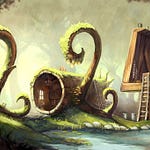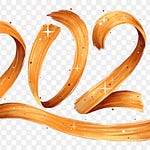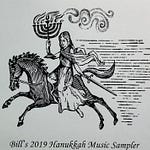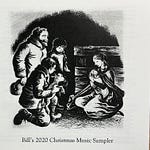The song and an instrumental
Today is the first evening of Hanukkah. Chanukah Light is from Oil for the Lamps, a folk opera about Hanukkah and its history that was written and composed by Joi Freed-Garrod. I recognized that the recording is not from the show’s only staged presentation to date, on Salt Spring Island in 2011 (see the trailer here, but ignore the address at the end) so I asked Joi about that. Here is her reply:
Yes, I'm singing, with the band: Violin, Carolyn Hatch; 'cello, Martin Thorne; keyboard, Tami dos Santos; accordion, Gail Sjuberg; clarinet, Wendy Milton. In the show, this was the introductory/first song, sung by all the cast.
I used recordings of each song as a 'teaching tool', to help the cast learn them. While we had ongoing scheduled rehearsals, there was a lot to learn - 8 songs, dances, acting sequences with blocking, etc. - so much for this cast who were mostly kids. We started by teaching them the songs, and encouraging them also to listen and sing along with the recordings as they practiced at home on their own to help internalize the lyrics, rhythms and sensibility of the songs. This deep knowledge was important as each song tells the story of an aspect of Chanukah as the show unfolds.
Besides being a musician, composer and lyricist, Joi is a Professor Emerita of the School of Education at Thompson Rivers University in Kamloops BC. It was this academic side of her persona that led her to contribute a chapter to a scholarly book called Cultural Education - Cultural Sustainability that explores how diaspora, indigenous and other ethno-religious minority groups can maintain their cultural identity and resist assimilation in multicultural societies.
It was the creative side of her persona that led Joi to create this folk opera to practice what she preached in that work. It follows up on a well-known fictional story of a family who was expelled from their ancestral home in Russia in 1905, and follows them through to present day North America. In her story, Tevye and his family tell (or more accurately, sing) about the Hanukkah festival as they celebrate it over its eight nights. Oil for the Lamps is still under development. If anyone knows of a theatre company that might want to consider putting on performances they can contact Joi at joiful7@gmail.com.
Hanukkah is an instrumental interpretation of the melody of the well-known Yiddish folk song Khanike oy Khanike, known in English as Oh Chanukah or Hanukkah, Oh Hanukkah. I’m sorry about all the various spellings but that is the way it is with Yiddish and Hebrew words. Those languages include sounds not used in English and the spellings for those sounds are not standardized. I found one source that has identified 17 different English spellings of חֲנֻכָּה.
The song is performed by the classically-trained concert cellist Rebecca Roudman performing with her own side-gig band Dirty Cello. Her band plays everything from the blues, to bluegrass, to folk-rock, and even a some classical music. This recording is from their EP album Happy Holidays. Here is a relatively recent interview with Ms. Roudman.
You probably recognize the melody. Khanike oy Khanike is perhaps the Hanukkah song that is most well-known by non-Jewish people (with the possible exception of that song about having a little clay dreidel.) The song is often attributed as being traditional because it was collected sometime before 1912 by the important Russian-Jewish musicologist and field folk-music collector Sussman Kiselgof. But Kiselgof collected it from a colleague, Lithuanian-born Mordkhe Rivesman, who had written it. Here is the original publication of the song, with an arrangement for it by the Ukrainian-born composer/arranger/pianist Pesach (Pavel) Lvov who worked with Kiselgof and Rivesman at the time at the short-lived but influential Society for Jewish Folk Music in St. Petersburg.
Essay: Hanukkah’s first origin story [word count 1383]
[Note: This evening begins the eight-day celebration of Hanukkah. Before getting into today’s essay I would like tell about an opportunity that many non-Jews have today to participate in celebrating this Festival of Lights. For at least the past 1500 years one of the protocols for the holidays has been the public display of the lit Hanukkah menorah except during times of danger. Recently this has extended in many towns and cities to erecting a large community hanukkiah in a public place, and inviting the general public to participate in lighting it and in the ensuing festivities on the first evening.
Here is an excellent article about the history and rationale for these public events. With its information some easy web browsing will enable you to find out if there is such an event near you. The event will probably begin at about 4:30 local time. If you live in or around Victoria, BC the information is available here.]
Hanukkah is both a religious and secular holiday for Jewish people. Its origin story is not directly related to the ubiquitous post-harvest festivities, or to celebrations of the winter solstice, although I think that there are relationships to both of those. More about that later in this series.
Actually, Hanukkah has two related origin stories. The first one is about celebration of one of the early important achievements in a successful rebellion against foreign domination and its corrupt local puppet regime. That achievement was the taking of Jerusalem and the rededication of its Temple by the Maccabees. It took another 20 years for the Maccabees to consolidate their victory, but taking Jerusalem was an important turning point in that war.
The Maccabean revolt occurred while Israel and Judea were subordinate states under the Greco-Syrian Seleucid Empire, one of four regional Grecian-culture empires that were created after Alexander the Great died childless. The revolution
was sparked after the Jewish puppet government and many leaders in the priestly class had become heavily Hellenized (i.e., they had largely adopted Greek culture) and were attempting to transition all of the local residents to the Greco-Syrian culture and lifestyle.
Things came to a head in 168 BCE when the Seleucid leader Antiochus IV (also known as Antiochus Epiphanes) ordered them to suppress the Jewish religion, and most of the Hellenized Jewish national leaders complied with his orders. Aspects of this religious oppression included converting the Second Temple in Jerusalem (the original one built by King Solomon had been destroyed in 587 BCE) into a temple to the Greek god Zeus, and requiring everyone to worship the Greek and Persian gods. That is when, as they say, the shit hit the fan.
Several local peasant revolts broke out against both the Greco-Syrian overlords and their local puppets but they soon coalesced under the military leadership of Judah ben Matityahu, who came to be known as Judah Maccabee – “the Hammer.” By 164 BCE the rebels had taken over the capital city of Jerusalem. The new regime declared independence from Seleucid control, and end to the old dynasty, and claimed authority over the Jewish lands.
An important part of re-establishing the integrity of Jewish culture and religion was purifying and rededicating the Temple. After the rededication there was an eight day celebration (possibly a deferred celebration of Sukkot, the Jewish equivalent of a post-harvest festival) that can be thought of as the first Hanukkah.
Here is the account of the rededication and the celebration that followed from chapter 4 of The First Book of Maccabees which was probably written by the Hasmonian court historian sometime between 134-104 BCE (Catholic Good News Bible translation):
52 The twenty-fifth day of the ninth month, the month of Kislev, in the year 148 [Note: this corresponds to 164 BCE] was the anniversary of the day the Gentiles had desecrated the altar.
53 On that day a sacrifice was offered on the new altar in accordance with the Law of Moses.
54 The new altar was dedicated and hymns were sung to the accompaniment of harps, lutes, and cymbals.
55 All the people bowed down with their faces to the ground and worshiped and praised the Lord for giving them victory.
56 For eight days they celebrated the rededication of the altar. With great joy they brought burnt offerings and offered fellowship offerings and thank offerings.
57 They decorated the front of the Temple with gold crowns and shields, rebuilt the gates and the priests' rooms and put doors on them. 58 Now that the Jews had removed the shame which the Gentiles had brought, they held a great celebration.
59 Then Judas, his brothers, and the entire community of Israel decreed that the rededication of the altar should be celebrated with a festival of joy and gladness at the same time each year, beginning on the twenty-fifth of the month of Kislev and lasting for eight days.
Here is the account of the same events as depicted in chapter 2 of the Second Book of Maccabees. The text is from a letter written by Jewish priests in Jerusalem to Jews in Alexandria, Egypt dated 124 BCE:
1 Judas Maccabeus and his followers, under the leadership of the Lord, recaptured the Temple and the city of Jerusalem.
2 They tore down the altars which foreigners had set up in the marketplace and destroyed the other places of worship that had been built.
3 They purified the Temple and built a new altar. Then, with new fire started by striking flint, they offered sacrifice for the first time in two years, burned incense, lighted the lamps, and set out the sacred loaves.
4 After they had done all this, they lay face down on the ground and prayed that the Lord would never again let such disasters strike them. They begged him to be merciful when he punished them for future sins and not hand them over any more to barbaric, pagan Gentiles.
5 They rededicated the Temple on the twenty-fifth day of the month of Kislev, the same day of the same month on which the Temple had been desecrated by the Gentiles.
6 The happy celebration lasted eight days, like the Festival of Shelters, and the people remembered how only a short time before, they had spent the Festival of Shelters wandering like wild animals in the mountains and living in caves.
7 But now, carrying green palm branches and sticks decorated with ivy, they paraded around, singing grateful praises to him who had brought about the purification of his own Temple.
8 Everyone agreed that the entire Jewish nation should celebrate this festival each year.
9 The days of Antiochus Epiphanes had come to an end.
These accounts identify the specific date of the rededication of the Temple and its following eight-day celebration. The date is given using the Jewish lunar calendar – the 25th day of the month of Kislev – which is when the annual holidays are still held. They also both describe a consensus at the time that eight days of festivities beginning on that date should become an annual event.
The raison d’être for the annual festival appears to be to celebrate both the purification and rededication of the Temple itself and the taking of Jerusalem and the proclamation of the end of Seleucid rule and resumption of Jewish autonomy under a new regime. In my reading of these accounts, purification and rededication of the Temple under a symbolic deadline seems to have been an important religious/cultural priority that needed to be accomplished before any celebration of the military victory could be held.
You may notice that these accounts, written only 40 years after the described events occurred, does not include the story about the miracle of the oil for the Temple’s menorah which is now a central focus of the Hanukkah holidays. This is surprising since one would expect that such a miracle would have been widely known and considered important at the time, and the books of Maccabees are replete with other such miraculous indications of God’s favour for the new Jewish leadership. I’ll cover this other origin story for the Hanukkah festival, and its core ritual of lighting candles which gives the holidays its alternative name of Festival of Lights, on Wednesday.
















Share this post